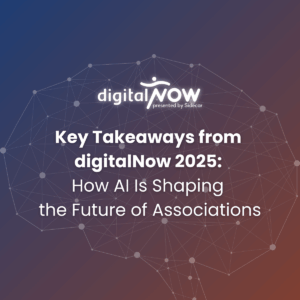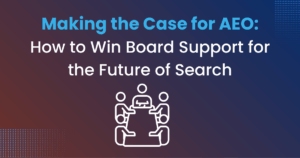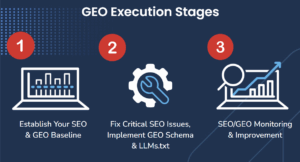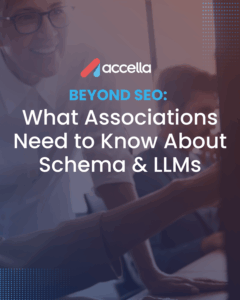During our latest webinar, some great questions came up around how associations can prepare their websites for the AI-powered search era. Two topics, in particular, sparked a lot of interest: Schema.org and LLMs.txt. Both play an important role in how your content is understood and used by generative AI tools—so let’s break them down.
Schema: Giving Your Content Meaning
Think of Schema.org as the “translator” that tells AI exactly what your website content represents. It’s a standardized vocabulary (often implemented in JSON-LD) that adds context behind the scenes.
Why Associations Should Care:
With Schema.org, associations can make their content more discoverable by clearly identifying items such as conference details like dates, locations, speakers, and registration links; tagging board members and staff as “Person” for accurate references; labeling research reports, policy papers, and newsletters as “Article”; and marking member companies or individuals as “Organization” to help AI correctly distinguish entities.
Example: If someone asks, “What events are hosted by [Your Association] next spring?”—AI can deliver exact event names, dates, and registration links because the data is explicitly defined.
LLMs.txt: Setting the Rules of Engagement
If Schema.org tells AI what your content means, LLMs.txt tells AI what it can and can’t do with it. Think of it as a new version of robots.txt—but specifically for large language model (LLM) crawlers like Perplexity, ChatGPT, and others.
Why Associations Should Care:
LLMs.txt allows associations to safeguard member-only resources by keeping reports, directories, and gated content out of public AI responses, while still promoting advocacy campaigns, press releases, and open events. It also ensures proper attribution when AI references your publications and gives you control over how often crawlers revisit fast-moving pages like news or advocacy alerts.
Example:
- Without LLMs.txt: An AI tool may surface an outdated press release in response to a query.
- With LLMs.txt: You can specify, “Re-check advocacy pages weekly, but exclude member-only research.”
How They Work Together
Schema.org helps AI understand your content by making events, leadership profiles, and publications machine-readable, while LLMs.txt sets the usage rules by defining what’s public versus restricted and ensuring your association receives proper credit.
Combined, these tools give associations two major benefits:
- Public events and advocacy gain visibility in AI-powered search.
- Member-only content stays protected while you still shape your organization’s reputation as an authoritative source.
Key Takeaways for Associations
- Add Schema.org markup to events, leadership profiles, publications, and membership directories.
- Implement LLMs.txt to balance content protection with discoverability.
- Together, they help your association control how AI sees and shares your content.
As AI-driven search evolves, these tools will be critical in ensuring your association’s work is both visible and respected in a world where answers matter more than links.
Check out the rest of our AEO blog series:
“Meet the Minds Behind AEO: 5 Perspectives Guiding the Future of Search” Read Blog
“What Is Answer Engine Optimization?” Read Blog
“The Death of the PDF: Why AI Can’t Find You” Read Blog
“Why Associations Need to Budget for AEO in 2026” Read Blog
“Your AEO Webinar Replay + Complimentary AI Search Readiness Report” Watch Webinar






